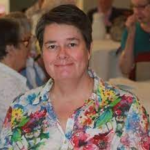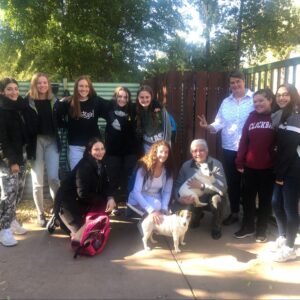
200 Years of Catholic Education: Interview with Sr Mary Wicks
 This week we celebrate Sr Mary Wicks, another Ursuline dedicated to serving God. Sr Mary has worked as a nurse and is now a doctor and medical specialist who lives in Alice Springs in Central Australia. She works predominantly with Indigenous communities and in the area of Indigenous Health, with a specialisation in Diabetes Care and Research. We interviewed Sr Mary for our research on Australian Catholic Church History.
This week we celebrate Sr Mary Wicks, another Ursuline dedicated to serving God. Sr Mary has worked as a nurse and is now a doctor and medical specialist who lives in Alice Springs in Central Australia. She works predominantly with Indigenous communities and in the area of Indigenous Health, with a specialisation in Diabetes Care and Research. We interviewed Sr Mary for our research on Australian Catholic Church History.
When did you first begin to think God might be calling you to become an Ursuline Sister?
A ‘call from God’ is a subtle thing and can take a while to work out. I was in Year 11 at school when I first felt attracted to religious life. I talked to an Ursuline Sister who taught me in Canberra. I was interested in nature and ecology, so I thought I was being called to be a Franciscan, so I contacted and stayed with the Poor Clare Sisters first but did not feel ‘at home’. In between this, I left Canberra after school and took a nursing job in Sydney. I contacted the Ursuline Sisters there and used to have chats now and then. It was only after three years of nursing, then specialty nursing in Critical Care, that I became a postulant, which is the first step to becoming a nun.
Why did you decide to become a sister and live out the Ursuline Values?
Becoming a nun wasn’t really an intellectual decision. I could easily have married my long-term boyfriend and had six children as he wanted! But I felt moved to try being a nun and would not have been able to settle until I had explored this. It was like a sense of unease that demanded attention and I knew I had to explore it. It has been very challenging at times – like all personal growth tends to be. Looking around the group of Ursuline Sisters I had decided to join, I saw that they were a motley mob (diverse group). A variety of personalities who were not necessarily people I would have chosen to live with and most of them would not have chosen to live with me either! Being part of a religious group has a different level of commitment than a friendship group. But it became clear to me that I belonged to this particular group trying to live out Ursuline life the best we could.
What does your work as a doctor in remote Indigenous communities involve?
A big question. I am a medical specialist not a GP, so in this role I visit communities, usually for a week at a time, and provide specialist medical care that is otherwise not available. The major health issues for remote Aboriginal peoples are:
- Premature death from nearly every cause and increased morbidity – in particular, diabetes mellitus and associated complications, cardiovascular disease (heart attack, stroke), rheumatic heart disease, end stage kidney disease and interpersonal trauma.
- Social issues such as, poverty, inadequate housing, inadequate health infrastructure in housing, interpersonal violence and for some, alcohol misuse
At present, I am also involved in research into diabetes, which is one of the major health issues for Aboriginal peoples in Central Australia.

What are the most rewarding parts about being an Ursuline Sister?
The values that are important to me do not necessarily require religious life. As you would know, there are many people doing great things in terms of social justice as single or married people. Being part of a group who share my values and are committed to each other is probably the most rewarding part of being a religious sister. We are like a family – we might not always agree but we do love and respect each other. We also believe that Jesus is the centre of our life.
How are the Ursuline Values evident in your current work?
A respect for the full humanity of all people and an openness to others, especially those who are different, are what I would hope that my work shows. Hospitality – a generous openness of spirit. Being competent in my medical skills, in cross cultural communication and showing care to my patients.
How do the Ursuline Values influence your day to day life and which one do you value most?
I live out of my values and Ursuline and personal values are the same for me. There is not a hierarchy of what I value most, as they all have their place. The main ones are
- Respecting the individual
- Social justice
- A focus on a relationship with Jesus Christ
How has this line of work changed you as a person?
I am not sure whether by ‘line of work’ you mean being an Ursuline or a doctor. I have been radically changed by both. I see both as a vocation rather than a job. Working with very remote living Aboriginal peoples has made me more aware of unjust structures and attitudes of our colonial past that continue to inform politics today and cause harm to Aboriginal peoples. There is great complexity in the relationships between Aboriginal and non-Aboriginal people and knowing how to really help people is also not always obvious and requires a lot of thought and discernment.
Do you have any tips about how the community can live out the Ursuline Values in their everyday lives?
I think the community has to live out fundamental Christian or humanitarian values of respect, care, equality, generosity etc. These are important for healthy communities, where all people can flourish and reach their potential within a community. This gaining of individual potential should not be at the cost of other people’s happiness and aspirations. The conditions in which individuals are born, grow, live, work, and age and the level of control they have over their life, fundamentally contribute to wellbeing. Our social systems should ensure that everyone has the possibility to flourish as human beings.

